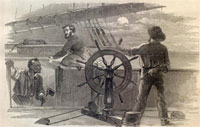William Tillman was the first black hero of the American Civil War. He was not a soldier but rather a 27-year-old cook/steward on the schooner S.J. Waring. One hundred and fifty years ago last Thursday, the schooner was captured by the Confederate privateer Jefferson Davis while about 150 miles from Sandy Hook, New York. Captain Smith, the master of the S.J. Waring was taken aboard the Jefferson Davis, and a five man prize crew was put aboard the schooner, with orders to sail her to a Southern port where the ship and her cargo would be sold.
William Tillman was a free black man, but was told that as a captive of the Confederacy, he would be sold back into slavery. Though at least one other member of the schooner’s original crew was held below in chains, as cook steward, Tillman was left to go about his regular duties. The prize crew made a fatal mistake in underestimating the cook steward. On July 16th, William Tillman decided to take back the ship.
William Wells Brown, an African-American writer and historian described Tillman’s one man rebellion in The Negro in the American Rebellion written in 1867:
Armed with a heavy club, he proceeds to the captain’s room. He strikes the fatal blow: he feels the pulse, and all is still. He next goes to the adjoining room: another blow is struck, and the black man is master of the cabin. Cautiously he ascends to the deck, strikes the mate: the officer is wounded but not killed. He draws his revolver, and calls for help. The crew are aroused: they are hastening to aid their commander. The negro repeats his blows with the heavy club: the rebel falls dead at Tillman’s feet. The African seizes the revolver, drives the crew below deck, orders the release of the Yankee, puts the enemy in irons, and proclaims himself master of the vessel.
The Waring’s head is turned towards New York, with the stars and stripes flying, a fair wind, and she rapidly retraces her steps. A storm comes up: more men are needed to work the ship. Tillman orders the rebels to be unchained, and brought on deck. The command is obeyed; and they are put to work, but informed, that, if they show any disobedience, they will be shot down. Five days more, and “The S.J. Waring” arrives in the port of New York, under command of William Tillman, the negro patriot.
Tillman’s arrival in New York in command of the S.J. Waring coincided with the Union loss at the Battle of Bull Run. His heroism in retaking the ship was seen in some measure counterbalance news of the Union defeat. The New-York Tribune wrote:
To this colored man was the nation indebted for the first vindication of its honor on the sea. Another public journal spoke of that achievement alone as an offset to the defeat of the Federal arms at Bull Run. Unstinted praise from all parties, even those who are usually awkward in any other vernacular than derision of the colored man, has been awarded to this colored man. At Barnum’s Museum he was the center of attractive gaze to daily increasing thousands. All loyal journals joined in praise of the heroic act; and, even when the news reached England, the negro’s bravery was applauded.
Tillman and the three other crew members of the S.J. Waring were awarded prize money for the schooner’s recapture and return. Tillman’s share was $6,000 (approximately $140,000 in today’s dollars.) As noted by the Tribune, Tillman was hired by P.T. Barnum’s New York museum to tell audiences the story of how he killed three of the “pirates” in less than eight minutes. He also became a featured public speaker in Philadelphia and Boston.
Tillman is believed to have moved to Rhode Island and is listed in the 1870 Census as living and working as a seaman in Warwick.
The privateer Jefferson Davis had a short and mixed career, capturing nine merchant sailing vessels. Three of these were recaptured, three were released, one was burned and two, able to reach port in the Confederacy, were auctioned. Less than a month after William Tillman arrived back in New York in command of the S.J. Waring, the Jefferson Davis, while attempting to enter harbor at Saint Augustine, Florida, went aground and was lost.
A new documentary, “Search for the Jefferson Davis: Trader, Slaver, Raider,” released in March, tells the story of the the hunt for the wreck of the privateer.
Search for the Jefferson Davis
Thanks to Irwin Bryan for passing the story along.

